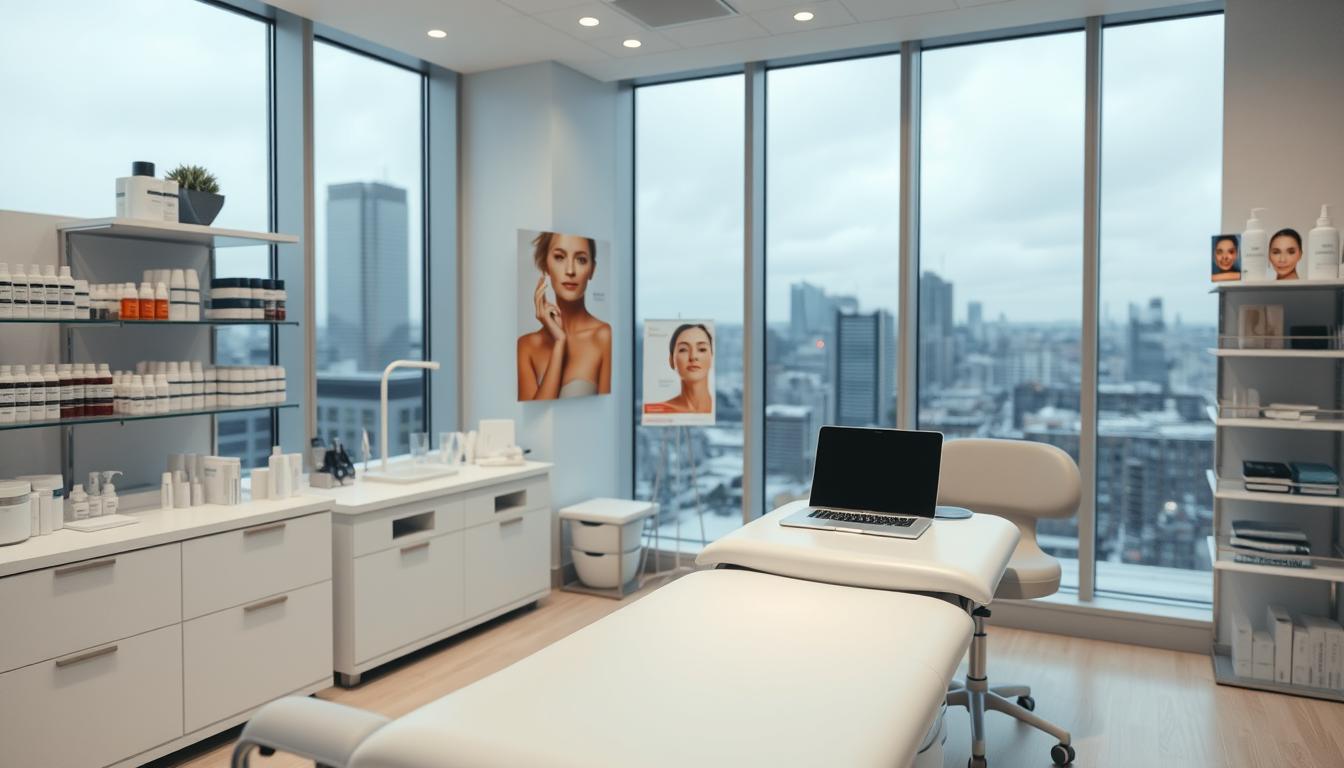Dealing with dermatological conditions can be overwhelming. It’s not just about how we look. Our skin health shows our overall health and affects our life quality. Understanding skin care is key.
We’re diving into the world of skin problems, from small issues to serious skin disorder treatments. We see how dermatology is vital for our health. This journey explores common skin issues, their causes, and treatments to improve our skin’s health.
Key Takeaways
- Understanding the importance of skin health is key to overall wellbeing.
- Identifying symptoms early can lead to better outcomes in skin disorder treatment.
- Knowledge of different dermatological conditions empowers individuals to seek appropriate care.
- Advancements in skin care and dermatology offer a variety of treatment options.
- Each individual’s skin is unique, and treatments should be tailored.
- Preventative measures and proper skin care routines are essential in maintaining healthy skin.
Understanding the Basics of Skin Health

The skin is the largest organ of the human body. Its health is key to our overall well-being and looks. Knowing what your skin needs is the first step to keeping it healthy and glowing. This part talks about what makes skin healthy, including the epidermis, dermis, hydration, skin barrier, UV protection, and a good skin care routine.
What Makes Up Healthy Skin?
Healthy skin has two main layers: the epidermis and the dermis. The epidermis protects us from the outside world. The dermis gives structure and support with its collagen and elastin fibers. Keeping your skin hydrated makes it elastic and less wrinkly.
A strong skin barrier keeps moisture in and out. It also protects against harmful pollutants and bacteria.
It’s important to use UV protection every day. Sunscreens protect our skin from UV rays, preventing early aging and skin cancer. A good skin care routine keeps your skin’s pH balanced, making it healthy and bright.
Common Factors Affecting Skin Condition
Many things can harm our skin, like pollution, stress, hormonal changes, and harsh chemicals. These can weaken the skin’s barrier, causing dryness, irritation, and faster aging. Understanding these threats helps us create a skin care plan that strengthens our skin and addresses cosmetic issues.
Identifying Common Skin Problems
Different skin conditions affect people in many ways. Acne, eczema, psoriasis, and rosacea can all impact your life. Knowing about these issues is key to managing them well.
Acne shows up as pimples, blackheads, and whiteheads. It’s common in teens and young adults because of hormones. But, it can also stick around into adulthood.
Eczema, or atopic dermatitis, causes itchy, inflamed skin patches. These patches might flake off or turn into skin lesions.
Psoriasis makes skin cells grow too fast. This leads to red patches with white scales. Rosacea, on the other hand, mainly hits the face. It causes redness, visible blood vessels, and sometimes pus-filled bumps.
These conditions can look like other skin issues. This makes it hard to get a correct diagnosis and treatment.
- Acne: Often appears on the face, chest, and back.
- Eczema: Frequently located on the neck, wrists, ankles, and areas that bend, like the inner elbow and knee.
- Psoriasis: Commonly found on the scalp, elbows, and knees.
- Rosacea: Typically presents on the cheeks, nose, chin, and forehead.
Learning about these conditions helps you get the right medical help. This can ease the discomfort and emotional pain they cause.
Skin Problems: Causes and Trigger Factors
Understanding the roots of various skin issues is key for effective management and treatment. Several factors, from environmental aggressors to genetic makeup, play a role in our skin’s health. This section will explore the main causes and trigger factors of skin disorders.
Environmental Factors
Repeated sun exposure is a big risk for skin disorders like melanoma and other skin cancers. Wearing sunscreen and avoiding peak sun hours can help. Also, skin irritants and allergens in some cosmetics or pollutants can cause contact dermatitis. It’s vital to identify and avoid these triggers to keep our skin healthy.
Genetic Predisposition
Hereditary skin disorders like eczema, psoriasis, and acne often come from our genes. While these conditions can be managed, knowing the genetic link helps in finding the right treatment and prevention.
Diet and Lifestyle
The impact of nutrition for skin is huge. Eating foods rich in antioxidants and essential nutrients helps protect our skin from damage. On the other hand, bad diet choices can make skin problems worse. Lifestyle factors like not enough sleep and high stress can also harm our skin, making it more prone to issues.
For a deeper look at how these factors impact our skin, check out this detailed guide on skin disorders.
Modern Treatments and Home Remedies
In the world of skin care, many solutions exist for different skin problems. This section looks at both new treatments and old natural remedies. It aims to give a full view of how to keep your skin healthy.
Over-the-Counter Solutions
Many people start with over-the-counter (OTC) products for their skin. These include creams, lotions, and gels for dry skin, acne, and mild eczema. It’s key to pick products that fit your skin type to prevent making things worse.
Prescription Medications
For serious skin problems, doctors might prescribe stronger treatments. These can be creams like retinoids or pills like antibiotics. Dermatologists carefully choose these after checking your skin.
Natural and Homeopathic Alternatives
Natural remedies are getting more popular for skin care. They use things like aloe vera, tea tree oil, and chamomile. These are known for soothing and healing the skin. Homeopathic options like calendula and arnica are also used for skin issues.
In summary, there are many ways to care for your skin. Whether you choose new products or natural remedies, knowing your options helps a lot. Using the right treatments and natural remedies can make your skin care plan work best for you.
Conclusion
In our journey to understand and manage skin conditions, we’ve learned a lot. We’ve seen how improving skin health is key. It’s about knowing what makes healthy skin and what affects it.
We’ve looked at common skin problems and what causes them. This shows how important it is to find what triggers your issues. And to create a comprehensive skin care plan that fits you.
There are many ways to treat skin problems, from over-the-counter products to natural remedies. But the real secret to maintaining skin wellness is prevention and ongoing care. By choosing wisely about our environment, diet, and lifestyle, we can control our skin’s health.
Keeping up with new discoveries in dermatology can also help. It gives hope to those dealing with long-lasting skin issues.
As we wrap up this article, remember that every step towards understanding your skin is a step towards better health. With the right approach, you can manage your skin condition and make it thrive. This not only makes you look better but also feel more confident.
Start this journey towards better skin with hope and the knowledge that you have the power to make a difference. You’re ready to make a lasting, positive impact on your skin’s health.




